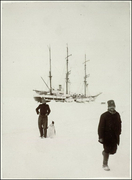First Music Manuscript Discovered in Antarctica
Friday, April 1, 2016

The RISM online catalog documents musical sources from five continents – so far, only Africa and Antarctica were missing from our map. So it came as a surprise, even to us, that Antarctica - of all places - will offer RISM users musical sources in the near future.
In a cave near the Norwegian research station Troll, a research team led by Dr. Solveig Spøk discovered indecipherable markings on a piece of tanned animal hide, which later turned out to be of seal origin. More interesting than the material itself were characters on the hide that represented a previously completely unknown form of musical transcription.
With the aid of concordant sources, a work entitled Oulde and Favourite Marche of ye Penguins could be identified by researchers. The anonymous score measures 150 x 80 cm. Choreographic instructions appear above the music, though instrumentation is unspecified. “When we first tried out the choreography, we didn’t see the point of it all,” Spøk told RISM. “But as we opened and closed our hands, flapped our arms that were bent at the elbow, wiggled downwards, and clapped our hands while rising again, it became apparent that the primary function of this march was to keep warm against the subzero Antarctic winds.”
The unusual manuscript was brought by members of the British Antarctic Survey to neighboring British Antarctic Territory for further examination and conservation, where it will be permanently housed in the well-equipped facilities of the Rothera Research Repository (RISM library siglum: AQ-Brrr). In the course of studying the manuscript, a small stain on the hide, likely of water, reminded the Rothera’s chief conservator of a similar water mark seen in the papers of the Scottish National Antarctic Expedition of 1902–1904, which are housed in the same facility. Consultation with these materials, in particular those concerning the British explorer William Speirs Bruce, resulted in the surprising discovery of a photograph that obviously documents the exact moment when an inhabitant of Antarctica led the explorers to the very cave where the Marche would soon be discovered (photo above, left). The researchers further pieced together that this incident must have occurred after an unsuccessful initial attempt at cultural exchange on the part of Bruce and his team (below).
Penguin: Not amused by the visitor.
Though the discovery of this manuscript leaves many questions open, the_Marche_ is being cataloged for RISM and will appear after the next update of the RISM online catalog, including a link to a digitized version. A facsimile edition of the manuscript will appear this summer from Aves Editions and a CD release will follow. In the meantime, please enjoy this audio excerpt from the Marche kindly provided by Aves:
Credits: Unknown photographers, Papers of William Speirs Bruce, University of Edinburgh, via Europeana (CC-BY), photos 0001495 and 0001492. Audio: Southern Rockhopper Penguin (Eudyptes chrysocome), recorded by Günter Tembrock, via Tierstimmenarchiv Berlin, Museum für Naturkunde Berlin (CC BY-NC-SA)
Share Tweet EmailCategory: Rediscovered

